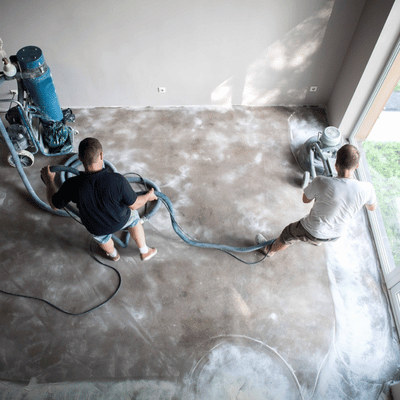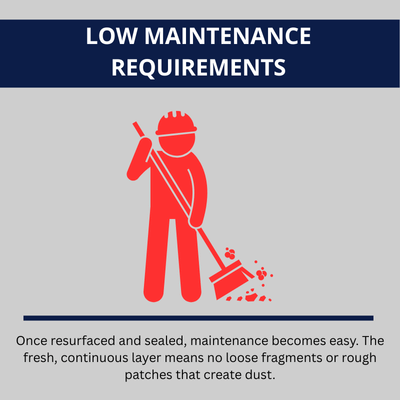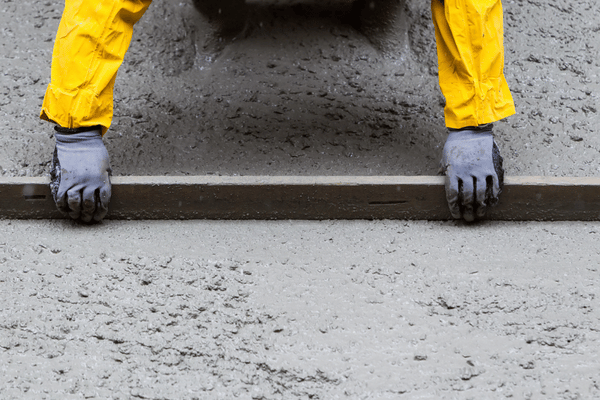Cracked, stained, or worn concrete doesn't mean you need to start over. Concrete resurfacing offers a smart way to restore your surfaces without the high cost of concrete replacement. This process applies a thin resurfacing compound with a resurfacer over existing concrete, creating a fresh new surface that looks and performs like new.
Choosing the right resurfacing method makes all the difference. A quality resurfacer not only covers flaws but also gives your concrete better durability and a clean, updated look.

Concrete resurfacing is a restoration method for structurally sound concrete that has cosmetic damage. The concrete resurfacing process involves applying a polymer-modified resurfacer compound as a new top layer over the cleaned, prepared slab. This overlay fills cracks and surface imperfections while bonding to the old concrete using bonding agents.
The concrete resurfacing process starts with thorough surface preparation. The existing concrete gets pressure-washed and any holes get filled with repair compounds. Next, a primer ensures the new layer sticks firmly. Then the resurfacer compound gets mixed and spread evenly across the surface area, typically at 1/8 to 1/4 inch thick.
While still wet, the overlay can receive texture options or color effects as desired. Finally, the surface cures and often gets protective sealers for enhanced durability. The result is a revitalized surface achieved in a fraction of the time and cost of pouring new concrete.
Modern concrete resurfacing system options come in various forms for different needs. The simplest resurfacing method is a cementitious overlay that restores a smooth finish to worn concrete. For decorative upgrades, stamped overlay resurfacing allows patterns that mimic brick, stone, or tile.
High-traffic areas often benefit from epoxy concrete resurfacing, where a tough concrete coating creates a chemical-resistant surface. There are also spray-down overlays and micro-topping resurfacing techniques for very thin, smooth coatings in interior concrete surface areas.
Each concrete resurfacing system has advantages. Epoxy and polyurea coatings offer superior durability and quick curing. Stamped or stained overlays provide rich aesthetics. An expert contractor will recommend the right resurfacing techniques based on your concrete project's needs using proper application techniques.

Resurfacing an existing slab delivers significant cost savings compared to full concrete replacement. Tearing out and re-pouring involves high labor, material, and disposal costs. Adding an overlay uses fewer resources and delivers results in roughly 90% of cases where the underlying concrete remains sound.
Projects that might require high cost for new concrete often get done at a fraction of that expense with overlay resurfacing. The resurfacer application process typically completes in just a couple of days, meaning minimal downtime for your driveway or facility. This cost advantage makes concrete resurfacing an attractive resurfacing solution.
One of the biggest draws of overlay solutions is the dramatic improvement in appearance. Rather than staring at drab, cracked concrete, you gain a fresh look without replacing the slab. Concrete resurfacing options are highly customizable with a wide range of colors, textures, and patterns through various customization options.
You can transform a plain gray patio into a decorative focal point that mimics flagstone, brick, or wood designs. Color effects like stains or dyes can be added to the concrete overlay mix. These aesthetic improvements let you match any style while significantly boosting property value using concrete coating designs.
The new overlay effectively covers minor cracks, pits, and surface damage, restoring a smooth finish to worn concrete areas. By sealing cracks, overlay resurfacing prevents water intrusion and further deterioration. This repair approach also eliminates trip hazards from uneven sections.
Many resurfacing materials can be formulated to enhance safety. An outdoor overlay can incorporate slip-resistant texture so pool decks stay safer when wet. The renewed surface improves traction and levels uneven spots, making concrete areas safer for vehicles and foot traffic through effective repair.
Quality concrete resurfacing strengthens and protects the concrete underneath. Many overlay products today contain polymers that give excellent strength, adhesion, and wear resistance. This added durability significantly extends the lifespan of your concrete installations.
The new layer shields the old surface from abrasion, weathering, and chemical attack. Epoxy and polyaspartic coatings form tough barriers that resist oil stains, tire marks, and UV exposure. With proper installation and maintenance, a resurfaced area can extend its lifespan for a decade or more. Thicker concrete overlay systems can provide a lifespan of 15-20+ years.

Once resurfaced and sealed, maintenance becomes easy. The fresh, continuous layer means no loose fragments or rough patches that create dust. Resurfaced concrete is easier to clean than old, porous concrete. Regular sweeping and occasional washing with mild detergent keeps it looking good.
Protective sealers help repel stains from oil and chemicals. By fixing small cracks through patching before the resurfacing project, you prevent future maintenance issues. There are fewer points for water to seep in or weeds to grow. While periodic sealing every few years is recommended, this maintenance task is straightforward.
The general rule is simple: concrete resurfacing works when existing concrete is structurally sound but has cosmetic issues. Concrete replacement becomes necessary when the structure has failed. If the slab isn't severely cracked through its full depth, not heaving from soil problems, and not crumbling apart, it's likely a candidate for an overlay.
Overlay resurfacing won't fix underlying structural problems or an unstable base. If a driveway has major sinkholes or a floor has deep structural cracks and shifting, adding a new top won't solve the root problem. In those scenarios with extensive damage, full concrete replacement may be required.
The good news is that extreme cases are relatively rare. In most situations, concrete resurfacing provides an excellent solution that avoids the cost and mess of demolition. As long as you have a viable foundation, it's almost always more cost-effective to choose resurfacing techniques rather than start from scratch with concrete replacement.
Resurfacing also sidesteps the logistics of hauling away tons of rubble and reduces environmental impact. By reusing the existing slab and upgrading its surface through the resurfacing process, you're making a sustainable choice that reduces construction waste.

A professional assessment determines whether repair options plus overlay work will suffice or if damage warrants concrete replacement. The concrete preparation phase reveals the true condition of your existing surface. In Texas, factors like clay soil movement and freeze-thaw cycles can be tough on concrete.
Even so, targeted repairs plus concrete resurfacing overlays can restore many slabs to like-new condition using modern concrete resurfacer products. Only when a surface is extensively cracked or unstable will a reputable contractor recommend full replacement over a concrete resurfacing system.
The application techniques and resurfacing materials available today make it possible to achieve stunning results while preserving your existing investment. Modern resurfacing method options provide excellent durability while maintaining the structural integrity of your concrete.
Concrete resurfacing has emerged as an efficient, high-value resurfacing solution for renewing aging surfaces. It delivers fresh aesthetics, improved performance, and extended service for your concrete at a fraction of the expense and time of pouring new slabs.
Whether you're upgrading a patio's appearance or revitalizing a commercial floor, overlay resurfacing offers versatile answers. With advancements in concrete resurfacer compound formulations, you can achieve anything from simple clean repairs to stunning decorative finishes.
Ready to give your concrete surfaces new life? Contact a trusted local contractor today to discuss the best resurfacing options for your specific needs. Don't let worn concrete drag down your property's appearance and value when an affordable concrete resurfacing solution can transform it completely. Your concrete deserves a second chance, and you deserve the savings and satisfaction that come with making the smart choice.

